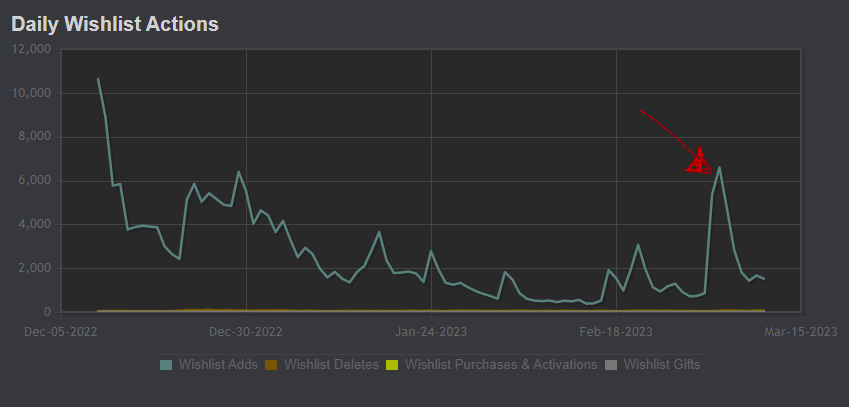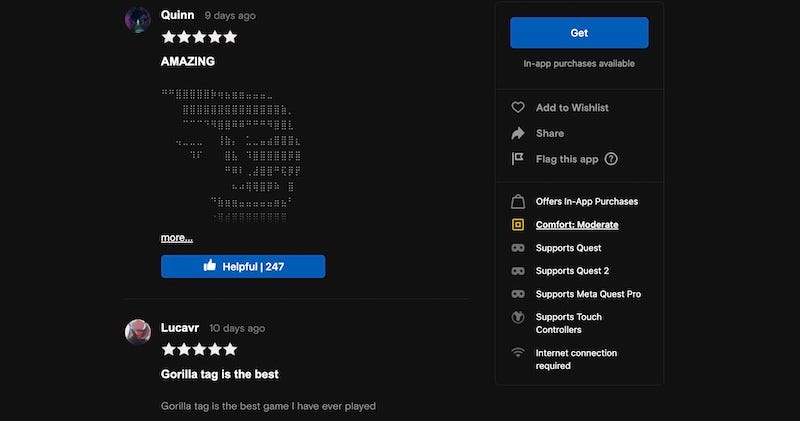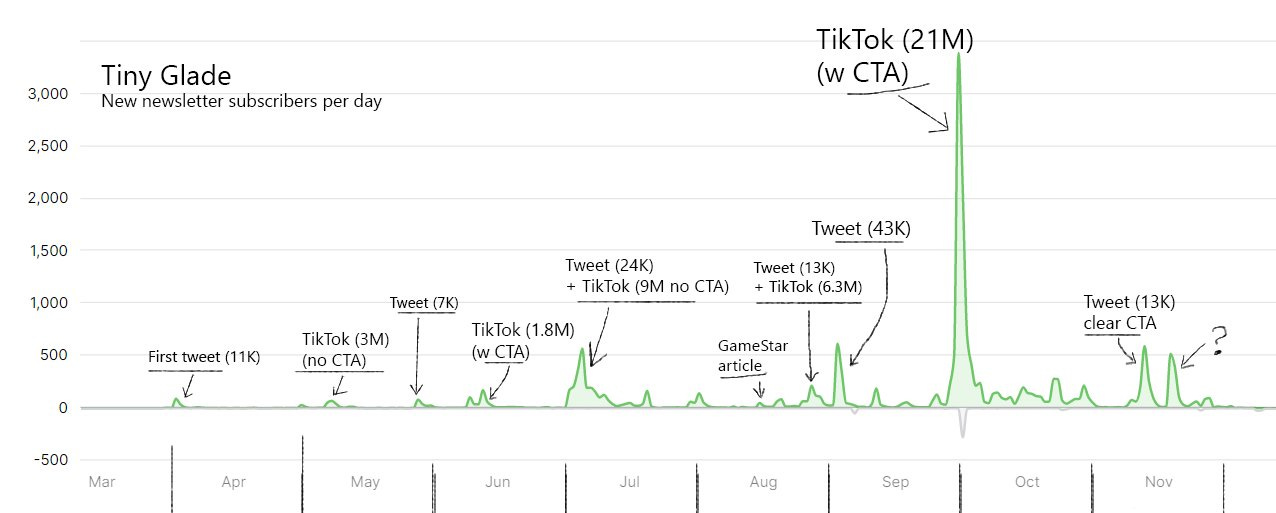One step beyond: how game contracts could evolve
Publikováno: 15.3.2023
Also: looking at Tiny Glade's impressive wishlist results, and lots more.
[The GameDiscoverCo game discovery newsletter is written by ‘how people find your game’ expert & company founder Simon Carless, and is a regular look at how people discover and buy video games in the 2020s.]
Week, meet middle? Middle, meet week. We’re going to keep our promise to y’all to email you entirely too often. And here’s the second free GameDiscoverCo newsletter of the week, to prove out that fact.
This time, we’re starting things off with a look at how one publisher is trying a very different approach to recoup when signing PC and console games - and asking why more publishers shouldn’t try similarly.
[PSA: please support us via our GameDiscoverCo Plus paid subscription, including interactive ‘Hype’ & post-release performance data for all Steam games, exclusive Discord access, our Friday game trend analysis newsletter & more. Much appreciated!]
One step beyond: how game dev contracts might evolve!

While the contracts that developers sign with publishers aren’t explicitly part of ‘game discovery’, the power exchange that occurs when the deal is made is - absolutely - vital in deciding what resources get put into having your game made successfully.
As a starting point, we’d define the history of PC/console publisher contracts as being divided roughly into two parts:
We’ll pay you to make a game that we can publish! Royalties later (maybe?): most ‘work for hire’ contracts of the ‘90s and ‘00s for console games were very much of this type. Your staff got paid to make a game, but you only triggered royalties under vanishingly rare circumstances. This… wasn’t great.
You’re making something great? We can fund it, and let’s split royalties differently pre-recoup and post-recoup: the norm for most of the past decade+ after the rise of the indie dev. Not saying all of these deals are perfect, but it’s better than ‘work for hire’, with opportunity for negotiation.
When it comes to this second state, Rami Ismail has written an excellent article on ‘upfronts, guarantees and recoups’, which goes deep into possible pre-recoup and post-recoup deals - citing some ideas as to the norms.
Summarizing: what you need to know is that most ‘normal’ deals nowadays allow the developer to recoup a smaller minority (let’s say 20%) of the game’s net revenue while the publisher recoups all of its initial $ given to the dev, plus out of pocket marketing.
After the publisher investment is recouped, the deal switches to a post-recoup mode, where the developer gets 50-70% of the ensuing net revenue, and the publisher keeps the rest. So there’s a very clear pre and post-recoup structure - it’s very standard.
But is there a newer or better way? We’ve been chatting to PC strategy game publisher Hooded Horse, who are genre experts and have been having a lot of success in the market recently with games like Terra Invicta and Against The Storm.
And their CEO Tim Bender is pioneering a new way of structuring contracts - a flat percentage royalty structure from the first dollar grossed. Hooded Horse’s deals vary a lot, but an example one would be 35% to the publisher and 65% to the developer for the entire lifetime of the game, even if there was an advance to fund the dev.
But why do this? Tim has a decidedly skeptical view of the current publishing deal structures: “Recoup terms where publishers take all of the revenue until they recover their expenses are essentially risk-shifting provisions – they shift risk of the game underperforming from the publisher to the developer…
Publishers have entire portfolios of games releasing each year to spread and diversify risk, while developers generally have one game coming out every few years. Full recoup terms are shifting the risk entirely to the party least able to manage and bear it.”
Sure, if a game hasn’t sold incredibly well, publishers don’t want to throw good money after ‘bad’, ROI-wise. But cutting off poor-selling games at the knees - by under-funding its devs with low royalties after launch - can backfire on publishers too.
Bender suggests of those with low dev recoup rates: “The publisher got to recover its expenses faster, but… lost out on the much better long-term sales that could have resulted from a game with better post-launch support, not to mention the harm to that publisher’s reputation with the consumers who bought the game.”
Obviously, I had some questions for Tim about this. Firstly, isn’t there a danger that the publisher will underspend on ‘out of pocket’ spending under this structure? For Hooded Horse at least, they guarantee a certain amount of marketing and localization spend in the first 6 months to a year after release, and build it into their fiscal models.
Secondly, is this method actually affordable when you’re also paying significant advances to developers? You’ll be recouping those advances at 35% instead of as high as 80%, after all. Doesn’t that sound.. scary?
Well, all Tim could say is that it’s affordable and workable for Hooded Horse, which runs fairly lean as a company, and has been birthed from an outsider perspective. It helps that the company’s 2022 releases have sold between 90,000 and 350,000 units each, with a median time since release of around 6 months. (That’s, uh, crazy good.)
And in a market where there are self-published games that still need help, being flexible and dev-friendly with terms is also working out for Hooded Horse. Heck, both Xenonauts 2 and (even more surprisingly) Manor Lords both did publishing deals with them, despite having big Steam followings without an attached publisher.
We’re presuming these aren’t ‘35% from Day 1’ deals, of course. But we suspect they’re at royalty rates which a) would look low to most publishing execs and b) are still going to be handsomely profitable. And this is where dev-friendly contract thinking pays off.
Tiny Glade: 260k wishlists in 3 months ain’t bad?
We were delighted when we saw Anastasia Opara make a detailed Twitter thread with stats on how her “small relaxing games about doodling castles” made with Tomasz Stachowiak, Tiny Glade, got 257k Steam wishlists in 3 months (!) after its announce.
The game has 21,000 followers, too and ranks #87 on overall Steam wishlists from the 10,000+ unreleased Steam games. So… how, and are we all jealous yet? Anastasia has some ideas, and we’ll augment and comment on ‘em:
It’s a ‘pure’ building/making game with a lovely interface: Anastasia notes: “I wanted to make a game that focuses on [the] aesthetic joy of making something pretty, because that's the part I hugely enjoy in games myself (Sims, Townscaper, Unpacking, Dorfromantik).” That’s a pretty good angle - unique precisely because it’s minimal.
Defining what the game isn’t helped nail down its virality: after early TikTok video experiments, she discovered “the genre was unclear. Many thought it was a tower defense or a management sim.” Thus Tiny Glade’s Steam description“says what this game is NOT: no combat, management, or wrong answers - just kick back and make something pretty.” TikToks with a similar message went viral: 9 million+ views.
Growing multiple channels - via TikTok, Twitter, newsletter - helped diversify interest: even without a Steam page live, the Tiny Glade team decided to direct interest towards a newsletter, and picked up >25,000 subscribers just by going viral on social media multiple times!
In fact, Tiny Glade’s newsletter growth curve is below, and reminds us that direct email marketing is still massively under-used in PC & console game marketing:
What happened next? Well, the game was formally announced at Wholesome Games’ Wholesome Snack: The Game Awards Edition stream in December (which was co-streamed on IGN, by the way!), and got 26k Steam wishlists in <2 days.
There was definitely some good press pickup - PC Gamer, Rock Paper Shotgun and GameSpot all covered the announcement. But it does look like virality on TikTok (in particular - there was another giant TikTok timed to announce) and Twitter helped.

There’s always a worry that ‘success bias’ makes lessons around titles like this feel dubious or ‘pat’. Anastasia herself commented: “I worry that it reads that one thing neatly led to another. It's easy to reconstruct a tidy story post-factum, but in reality it was a combo of an iterative process AND factors outside of our control.”
So, two things here. Firstly, you have to be pretty methodical to even put this amount and variety of marketing together in the first place. So you may not win out unless you try a big variety of tactics - and most don’t.
But second, the ‘hook’ here is clear. It’s the dynamic building/terrain-generating interface and modeling/lighting that really sell Tiny Glade. Making something that looks this visually enticing is actually really difficult. Yet the team working on Tiny Glade has clearly done it:

Where this goes at launch, we’ll see - not all TikTok virality means heaps of sales. But there’s room for more minimal, wholesome games like Tiny Glade - perhaps not at a $30 price point, but at $7-$15 like Dorfromantik and Townscaper. Looks promising!
The game discovery news round-up..

Finishing up the free GameDiscoverCo newsletters for this week (sign up now to get Friday’s Plus paid analysis in your inbox!), let’s take a look at some of the discovery & platform news we’ve spotted:
Off to GDC next week? GI.biz did a 'GDC survival guide’ with a couple of tips from me, among many other ‘more notables’. My top tip? “If you have a little time spare during GDC, go to the SFMOMA, steps from Moscone Center. It really is a world-class modern art museum, it's surprisingly large.. and some elements are 100% free. It'll help you relax and recalibrate!”
The U.S. Federal Trade Commission finalized its $245 million ‘dark patterns’ order against Fortnite - the money is going back to consumers - and we highly recommend reading the final consent order [.PDF] in part. (The ‘click once to buy, no refund safeguards’ purchasing Epic implemented is laid out in clinical detail.)
Interesting to see the results of dev Bedtime Digital giving away its game Figment en masse on Steam, ahead of the release of Figment 2 this week. Players maxed out at 47,000 DAU and 4,200 CCU, after giving away hundreds of thousands of keys. (Figment 2 is well-reviewed, but didn’t get >60 CCU, oh well.)
There’s a big new Unity report (press release, full report) with their 2c on the state of the game biz. Highlights? A claim that: “62% of indies and 58% of midsize studios are now making games in less than a year, from start date to ship date.” (Shorter mobile titles, surely?) Oh, and “88% of studios with more than 50 people are making cross-platform games.”
Microsoft x Activision merger news? Xbox signed some more ‘10 year deals’ for their combined catalog, with cloud services Ubitus and Boosteroid - looking forward to that Texas Instruments calculator deal for Call Of Duty, too! And the FTC wants more detail from Microsoft on some of these deals, as well as Microsoft's ZeniMax/Bethesda game exclusivity plans. It just keeps going…
Sony’s third-party portfolio head Shawne Benson got interviewed at 80.lv, noting a set of ‘PlayStation 5 pillars’ her team looks for re: enhanced support, and commenting: “There are certain types of genres that struggle in that space… for example, strategy and RTS games don't typically lean themselves super well to the platform.”
Meta took a curiously long time dealing with app referral spam (‘25% off if you use my coupon!’) in Quest game reviews, and some developers are over it, but Meta now says it’s dealing with it now. (There’s still a lot of top-ranked ASCII art pictures in reviews, though - see above example for Gorilla Tag :P)
Following on from our (data-light) ‘your Early Access launch is sorta your launch’ newsletter, HowToMarketAGame’s Chris Zukowski is fielding a survey to get Steam devs to (anonymously) contribute their Early Access launch stats, what discounts they did during EA, and then their 1.0 launch results. Please contribute!
Nintendo’s Doug Bowser got quizzed over at the AP, and besides vagueness on the next Nintendo console, his comments on the new Zelda costing $70 are notable: “I think fans will find this is an incredibly full, deeply immersive experience... This isn’t a price point that we’ll necessarily have on all our titles.”
Microlinks: PlayStation Plus’ Game Catalog line-up for March includes Tchia, Uncharted: Legacy of Thieves Collection & Ghostwire Tokyo; Valve likes the idea of an OLED Steam Deck, too, but says it isn't as simple as it sounds; Steam released an update to the Steam Mature Content Survey and pre-release review process which generates ratings for players in Germany, and asks y’all to fill it out.
Finally, we’ve all seen great game trailers - but how about deliberately horrible ones? Derek Lieu did just that for Firewatch to make some points on music choice, opening logos/shots, excessive text on screen, and (not) explaining your game properly. Love it:
[We’re GameDiscoverCo, an agency based around one simple issue: how do players find, buy and enjoy your PC or console game? We run the newsletter you’re reading, and provide consulting services for publishers, funds, and other smart game industry folks.]
